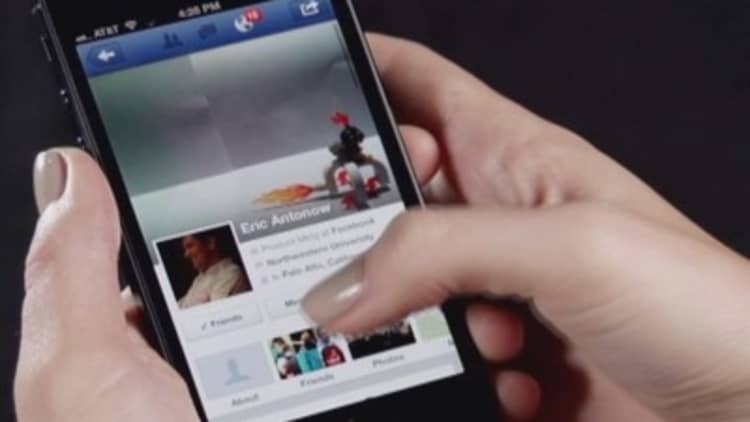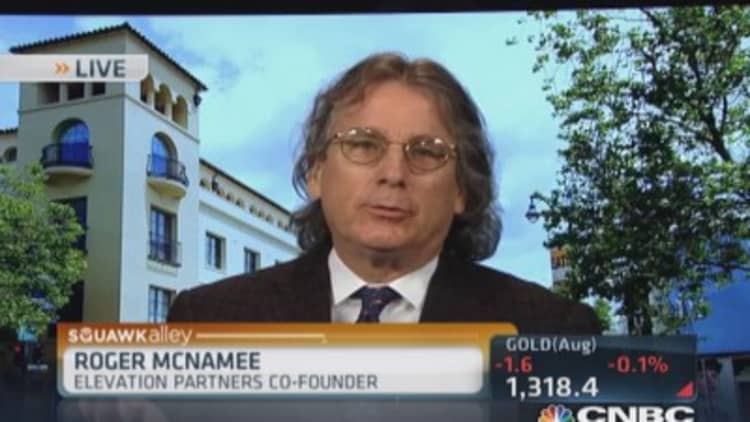
Facebook's reliance on traditional Web advertising is a thing of the past. Two years removed from its controversial initial public offering, the social network has rapidly become the second-biggest recipient of mobile ad dollars, behind Google. Those tiny smartphone promotions now account for over half of sales.
Even with Facebook capturing headlines in 2014 for its massive acquisitions of WhatsApp and Oculus VR, the success of Wednesday's second-quarter earnings report will hinge on the trajectory of the company's ad business. That now includes video ads – 15-second spots that Facebook introduced in March for a select few brands, helping businesses bring a TV-like experience to mobile viewers.
The momentum has driven Facebook shares up 27 percent this year to $69.27 as of Tuesday's close, near the stock's record of $72.59 reached in March. (Click here for the latest price.)
"Advertiser demand for social continues to be strong as brands ramp spend across Facebook's ad products,"Ronald Josey, an analyst at JMP Securities, wrote in a report this month. As Facebook "becomes a `must buy' across a broader set of advertisers—large and small—and given the company is limiting supply, we continue to believe there is significant room for pricing power going forward," he wrote.
Read MoreFacebook has tremendous momentum
Analysts on average expect reported revenue growth of 55 percent to $2.81 billion, according to a survey by Thomson Reuters. Josey, who has a buy rating on the stock and a price target of $83, predicts mobile revenue more than doubled in the period to $1.63 billion.

With Chief Executive Officer Mark Zuckerberg's relentless push into smartphones and tablets, Facebook's worldwide market share in mobile ads will be 22.3 percent this year, up from 5.4 percent in 2012, according to eMarketer, while Google's has dropped from 52.6 percent to 50.2 percent. No other company is close. Twitter ranked third at 2.8 percent.
From here things get more difficult for Facebook, at least in the U.S. EMarketer predicts the company's domestic market share will drop to 15.1 percent by 2016 from 18.7 percent this year, as smaller competitors vie for mobile dollars.
That's why Zuckerberg is going overboard to capture the attention of smartphone users, even if it's not clear how those eyeballs will lead to additional revenue. In February, Facebook agreed to buy messaging app WhatsApp for $19 billion, marking the biggest Internet acquisition since the bubble era and the catastrophic AOL-Time Warner merger.
WhatsApp has made a little money by charging a nominal fee (99 cents a year) after a customer's been using it for free for a year, but Facebook is pursuing the huge and growing base of 500 million users globally.
Facebook experiment

And last week Facebook jumped deeper into mobile commerce by initiating the testing of a "Buy" button, which allows users to click into an ad on a smartphone and purchase the product being promoted. The announcement came shortly after Facebook poached PayPal head David Marcus to run its messenger business.
"While the Buy-button by itself should help drive e-commerce on FB, we feel it is a strategically important tool to get users to link their payment information into their FB profiles," Janney Capital Markets' Tony Wible wrote in a report. He recommends buying the stock and has a $71 fair value estimate on the price.
Unlike Twitter, which has yet to generate earnings, Facebook is profitable and getting more so by the quarter. Earnings per share likely increased to 32 cents from 19 cents a year ago, analysts predict.
—By CNBC's Ari Levy.


